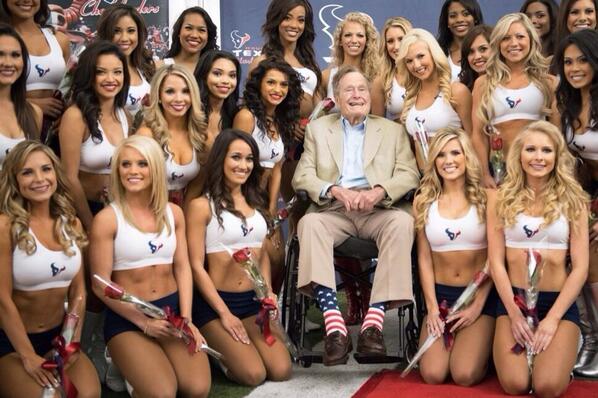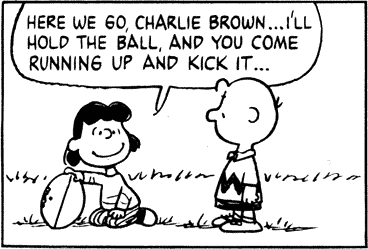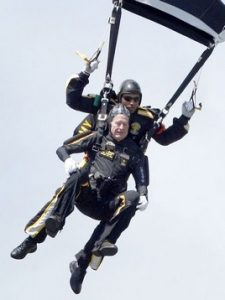Thanks to a timely heads up by Stanis Moody-Roberts, I was able to catch the HBO premier of “41” two nights ago. It is well worth watching, not so much for breaking new ground – it mostly skimmed the most significant events of Bush’s life – but for providing an intimate glimpse at a man looking back on a career that saw him reach the pinnacle of political power, only to be voted out of office by the people he tried to serve. In watching the movie, I was reminded of just how prepared George H. W. Bush was as president to handle a series of extraordinary foreign policy crises, beginning with the 1989 Tiananmen Square protest in China through the collapse of the Soviet Union and the end of the Cold War to the decision to repel Saddam Hussein’s attempt to annex Kuwait. These were momentous events and, for the most part, he handled them with extraordinary skill. And yet, he was voted out of office, the victim of an economic downturn that had almost nothing to do with his policies. Indeed, it was his decision – one he stands by to this day – to break a campaign promise and raise taxes that helped close the budget deficit and set the stage for the surpluses during Clinton’s second term. For that act, against the backdrop of an economic recession, Bush was booted from office. The film is an extraordinary reminder of how much our evaluations of presidents often turn on events about which they have little control and that even when they do make the “right” decision, they aren’t always rewarded.
When Bush ran for president against Ronald Reagan in 1980, detractors chided him as the “resume” candidate – someone who had numerous job experiences, but who hadn’t really shown signs of leadership. However, while it is true that there is no way to truly prepare to be president, Bush came as close as any president in recent memory to taking office with a deep understanding of how government works at the national level and with a strong network of relationships with leading political figures both home and especially abroad. He also was, by all evidence, a man devoted to family, and to the patrician principles instilled in him during his upbringing: duty, honor, love of country and a certain personal code that, among other virtues, precluded drawing attention to one’s self or directly criticizing others.
The son of Connecticut Senator Prescott Bush, George grew up in a privileged childhood, much it spend at the family compound at Kennebunkport – a location that Bush clearly loves, and which figures heavily in the film. In 1941 Bush was attending Phillips Academy in Andover, where he was by his own admission a middling student, but otherwise a B.M.O.C (Big Man on Campus) due in no small part to his athletic prowess when the Japanese attacked Pearl Harbor. Although he had been accepted to attend Yale that fall, Bush instead at age 18 immediately enlisted, against his father’s wishes, in the Navy’s aviation wing and became the youngest commissioned pilot in the country at that time. One of the more poignant moments in the film is when Bush recounts getting shot down on a bombing run in the Pacific. Although Bush was able to bail out of his damaged aircraft, both of his crewmates died (one ejected but his parachute failed to open, and the other went down in the craft) – an event that still haunts him. One can’t help but wonder if Bush’s wartime experience – particularly his experience with death – contributed to his decision to halt the carnage the U.S. was inflicting on Saddam Hussein’s military forces during the First Persian Gulf War.
After successfully entering the oil business in Texas, Bush embarked on a political career, beginning with an unsuccessful attempt to unseat incumbent Democrat Senator Ralph Yarborough in 1964. He followed that by winning a House seat in 1996 for the 90th Congress, part of a large Republican freshman class that election cycle. Bush then served in a series of high-level appointed positions: Ambassador to the United Nations (1971-73), chair of the RNC during the Watergate period (1973-74 – Bush eventually broke with Nixon); ambassador to the People’s Republic of China (1974-76 – he remembers spending a lot of time bicycling through Beijing), and finally director of the CIA (1976-77 – a key period in which Bush help restore the CIA’s reputation). In 1980, he was Reagan’s main rival for the Republican nomination but despite an unexpectedly strong showing in Iowa, he lost to Reagan in New Hampshire after the famous debate debacle in which an angry Reagan issued his celebrated “I paid for this microphone, Mr. Green” line.
Arguably, it was his 8 years as Reagan’s VP that best prepared Bush for the presidency. Although Bush acknowledged that he took a lot of grief for spending so most of his time as VP attending state-level funerals, he recall that he developed relationships with numerous rising leaders, including Mikhail Gorbachev, during these trips. It was that relationship with Gorbachev that helped Bush steer the U.S. through one of the potentially most perilous periods in his presidency: the collapse of the Soviet Union and the end of the Cold War. In “41” Bush recalls that he took tremendous criticism for not flying to Berlin to openly show U.S. support to the thousands of demonstrators who were celebrating the end of Communist rule, symbolized by the tearing down of the Berlin Wall. But, as I suggested in my earlier post on this topic Bush is adamant that appearing to gloat at the moment of East Germany’s collapse would have been the worst possible signal to send, with Gorbachev in such a precarious position trying to manage the transition to democracy in Russia. It might have provoked a military backlash there, diplomatically, as the Soviet empire unraveled.
It was this type of prudence that characterized much of Bush’s foreign policy. Ultimately, of course, it was the economic recession, and his breaking of his famous “read my lips” pledge that led to his 1992 loss to Bill Clinton. Although Bush stands by his decision to break the no taxes pledges, he does express regret that he made that original pledge using such forceful and unambiguous language. (The words were actually written by Bush’s speechwriter Peggy Noonan and they are a reminder that while speechwriters are motivated to craft memorable lines, they don’t always think enough about the potential political ramifications of uttering those lines.) That stark wording, Bush acknowledged, made the fallout from breaking the pledge that much more severe.
It is clear in the film that Bush still bears the scars from that loss to Clinton. There are two indications of this. First, in the only direct attack on another individual that you will hear from Bush in the film, he flat out states that he doesn’t like H. Ross Perot who, in Bush’s view, cost him the election. (Perot won about 19% of the popular vote in 1992). He also suggests that the media was in the tank for Clinton. These are strong words from a man who does not express very many regrets in his life, and who seems generally to be quite content with what he has accomplished. Clearly, the loss in 1992 still hurts.
Although slowed by Parkinson’s, Bush continues to be active. He spends much of his time at Kennebunkport piloting his kick-ass speedboat at high speeds through the Atlantic, tailed by Secret Service agents who must be cringing at the sight of this 88-year old man jumping the waves. As Bush (who was a very good three-sport athlete) somewhat wistfully relates, however, no one will pick him “for the team” anymore, given his physical infirmities. So driving his speedboat is one of the few ways he can still “stay in the game.”
Interestingly, and perhaps consistent with those patrician values that included an aversion to self-promotion, Bush did not write the standard post-presidential memoirs. Instead, he co-authored a book with his national security adviser Brent Scowcroft that focuses almost exclusively on foreign affairs. And that’s why “41” is well worth watching – it provides an intimate glimpse into a man who has spent much of his life deflecting personal attention even as he served in the most high profile position in the world.
How should we remember George H. W. Bush’s presidency? Inspired by Lizzie Borden (the Fall River, MA. woman charged with hacking her father and stepmother to death with an axe), I penned the following tribute, which I think captures the essence of Bush’s time in office:
We gave George Bush a budget axe
Instead he chose to raise our tax.
When we saw what he had done.
We voted out “Forty One”.



